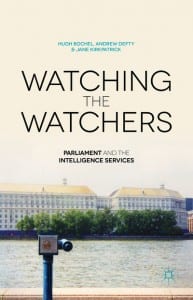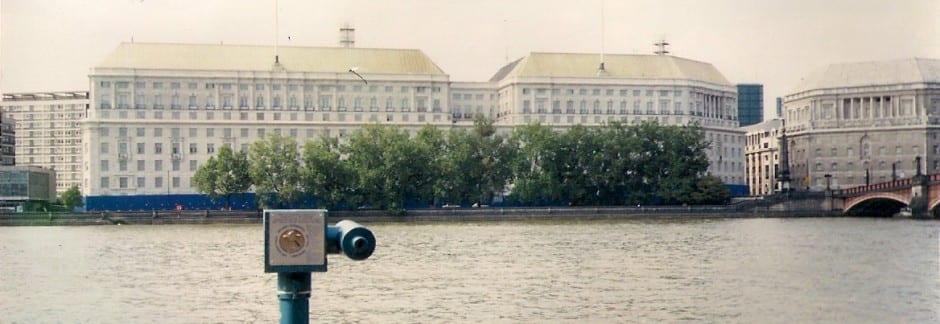 Our new book, Watching the Watchers: Parliament and the Intelligence Services, has now been published by Palgrave Macmillan.
Our new book, Watching the Watchers: Parliament and the Intelligence Services, has now been published by Palgrave Macmillan.
The book provides a new and detailed examination of parliamentary scrutiny of the British intelligence and security agencies, and policy. Through detailed analysis of parliamentary business, coupled with interviews with more than 100 MPs and Peers and a number of senior officials in the Cabinet Office and the Foreign and Commonwealth Office, it examines the various mechanisms by which parliament seeks to scrutinise the secret state, and assesses the extent to which parliament has both the capacity and the will to provide effective oversight of intelligence and security policy and agencies. In addition to providing a detailed analysis of the impact of the Intelligence and Security Committee, this is the first book to examine the various other means by which a range of parliamentary bodies including select committees, all-party groups and individual parliamentarians have sought to scrutinise the intelligence agencies and the handling of intelligence by government.
Until recently, intelligence and security matters were not the subject of parliamentary debate in the United Kingdom. The veil of secrecy surrounding the intelligence and security agencies has gradually lifted since the late 1980s when a raft of legislation placed the agencies and their activities on a statutory footing. In particular, in 1994 the Intelligence Services Act created for the first time some form of parliamentary oversight of the intelligence and security agencies with the establishment of the Intelligence and Security Committee (ISC), a cross-party committee of parliamentarians, to examine the ‘expenditure, administration and policy’ of the agencies. Whilst the role of the ISC has expanded considerably since 1994, questions remain about whether this is the most effective means of providing oversight, and in 2013 the government introduced the first substantive reforms of the ISC as part of the Justice and Security Act.
There is also evidence of an appetite for greater parliamentary scrutiny of intelligence beyond the ISC. Prompted in part by the Labour government’s use of intelligence to make the case for war in Iraq, terrorist attacks in the United Kingdom, and concerns about the role of the intelligence agencies in the interrogation of terrorist suspects, a number of parliamentary bodies and individual parliamentarians have pressed for broader parliamentary scrutiny of intelligence. In particular, in recent years a number of parliamentary select committees, most notably the Home and Foreign Affairs committees and the Joint Committee on Human Rights, have called for greater parliamentary accountability for the intelligence and security agencies, including the replacement of the ISC with a parliamentary select committee. In some areas All-Party Groups, such as the APG on Extraordinary Rendition, have sought to pressure the government and the ISC to reveal more about the work of the agencies. There is also evidence that the House of Lords is playing a more central role in the scrutiny of intelligence issues, with the first ever Lords debate on the work of the ISC in 2006, and the appointment of Peers with direct experience of the agencies, most notably Pauline Neville-Jones, former Chair of the Joint Intelligence Committee, and Eliza Manningham-Buller, the former Director-General of MI5, who used her maiden speech to attack proposals for the detention of terrorist suspects for up to 42 days.
Existing studies of parliamentary scrutiny of intelligence within the UK have focused almost exclusively on the work of the ISC. This is the first book to examine the role of parliament as a whole in this respect.
Chapter headings:
1. Introduction: The challenges of legislative oversight of intelligence
2. ‘The Government does not comment’: Parliament and the intelligence services
3. Managing continuity and change: legislating for intelligence agency accountability
4. ‘A unique and special committee’: the Intelligence and Security Committee
5. Issues of accountability and access: the select committees and intelligence
6. Other indicators of parliamentary interest: debates, questions, motions and groups
7. ‘No longer scared to ask…’: Parliamentarians and the intelligence services
8. New possibilities: legislative oversight of intelligence beyond Westminster
9. Conclusions: Parliament and the future of intelligence oversight
Sample chapter available on Palgrave website.
Hugh Bochel, Andrew Defty and Jane Kirkpatrick, Watching the Watchers: Parliament and the Intelligence Services, London: Palgrave Macmillan 2014, ISBN 9781137270429, hb. £68, also available as an Ebook.
